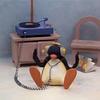Take a photo of a barcode or cover
dark
mysterious
reflective
sad
tense
medium-paced
A couple of music geeks make a fake vintage blues record based on some street recordings they made, only it turns out to possibly not be a fake. Being interested in blues history, I found this premise intriguing. This story takes place in the present day but parts are in the past. (At times it's unclear when things are happening; you could call it magic realism, or you could chalk it up to the narrators unstable mental state.) It involves record collectors (one wealthy, one not) and an old bluesman who may or may not have existed. The premise was intriguing. However most of the characters were not very likeable. There was a lot of drug use and unpleasant people. And then...well, without spoilers, I'll just say I didn't enjoy the direction this went. So, my summary is this started out interesting but I can't really recommend it.
This book was nothing like I expected but in all the wrong ways.
I was expecting to be made uncomfortable by a hard hitting novel that would be unforgiving in its exposition of racism, especially in relation to the theft of black music. Instead, we're given a few quotable quotes jumbled up inside a book that's all about white men. The two young white men at the center of the story are the only characters that are developed in any real way. And for a book that's supposed to be critical of cultural appropriation I find it ironic that there is no solid attempt to tell black stories - the black characters are cliches and their stories are background noise to the story of two white people.
The plot itself was also unbelievable. I was not convinced by any of it and the further on it went, the more messy it became. It didn't help that all of the characters besides Seth and Carter were stereotypes. The way Leonie, the solitary female character, was conveyed just made me cringe. She was in no way a real person to me.
I strongly disliked the way this was written. It's my first Kunzru and my last. Kunzru seemed more concerned with flaunting how much research he did than actually telling a story. It honestly felt that all of those little factoids were included just to mask the fact that he actually didn't understand the music and engineering himself. This is also another novel that mistakes documenting bodily functions, drug use, sex and a lack of personal hygiene/cleanliness with having an insight into human nature. The whole thing felt so fake.
I was expecting to be made uncomfortable by a hard hitting novel that would be unforgiving in its exposition of racism, especially in relation to the theft of black music. Instead, we're given a few quotable quotes jumbled up inside a book that's all about white men. The two young white men at the center of the story are the only characters that are developed in any real way. And for a book that's supposed to be critical of cultural appropriation I find it ironic that there is no solid attempt to tell black stories - the black characters are cliches and their stories are background noise to the story of two white people.
The plot itself was also unbelievable. I was not convinced by any of it and the further on it went, the more messy it became. It didn't help that all of the characters besides Seth and Carter were stereotypes. The way Leonie, the solitary female character, was conveyed just made me cringe. She was in no way a real person to me.
I strongly disliked the way this was written. It's my first Kunzru and my last. Kunzru seemed more concerned with flaunting how much research he did than actually telling a story. It honestly felt that all of those little factoids were included just to mask the fact that he actually didn't understand the music and engineering himself. This is also another novel that mistakes documenting bodily functions, drug use, sex and a lack of personal hygiene/cleanliness with having an insight into human nature. The whole thing felt so fake.
This book was intense and odd and confusing in a way that was engaging and fun - nonlinear/crossover timelines and loose realities. There's a lot of appropriation of black culture/racial police brutality/casual white liberal racism/Jim Crow era racism from unlikable characters/unreliable narrators, which is taken to task somewhat in the end but is so dense and convoluted it requires some real unpacking.
This book was a little bit of everything and at times a disorienting read. Scanning reviews afterwards helped to contextualise some of the themes that the book explored, which honestly, I missed from being too busy just trying to keep up. One of those books that needs a second reading if you can spare the time.
challenging
dark
emotional
informative
reflective
sad
tense
medium-paced
Plot or Character Driven:
A mix
Strong character development:
Yes
Loveable characters:
Yes
Diverse cast of characters:
Yes
Flaws of characters a main focus:
Complicated
Like, if High Fidelity was written by David Lynch! Elements of Francis Ford Coppola's 'The Conversation' & Michelangelo Antonioni 'Blowup' or 'Blow Out' (remember Blow Out?) Brian De Palma starring John Travolta. And with its Soul Jazz Blues referencing record collecting definitely a hint of [b:Telegraph Avenue|10756240|Telegraph Avenue|Michael Chabon|https://i.gr-assets.com/images/S/compressed.photo.goodreads.com/books/1335716595l/10756240._SY75_.jpg|15667548]
Starts out a simple story of two white guy audiophiles obsessed with Black music (Beastie Boys? Blues Brothers? )“more intense and authentic than anything made by white people”.
"We knew we didn’t own it,” admits Seth, “a fact we tried to ignore... masking our disabling caucasity with a sort of professorial knowledge.”
very uncomfortable reading (/listening), I remember stoned conversations with friends , in my early 20s while we earnestly discussed the Authenticity of reggae/funk/blues/soul versus white pop (stolen white pop)
Seth is slightly unhinged believing that every sound that has ever happened still resonates - you just need the right equipment to hear it. He's also slightly ( just slightly?) creepy, with hidden equipment he records/eavesdrops on the ambient surrounding.
When he listens back to one of his recordings he hears the Graveyard Blues.
He and Carter create a hoax, they slap scratches all over the recording, invent the undiscovered blues legend Charlie Shaw and pass it off as a 78.
However Charlie Shaw was real, he never got paid, and he's coming back to collect his dues.
A weird and creepy ghost story, a terrifying murder mystery with a great soundtrack:
http://knopfdoubleday.com/2017/03/28/white-tears-playlist/
"If horror believes in you, there's nothing to be done."
Starts out a simple story of two white guy audiophiles obsessed with Black music (Beastie Boys? Blues Brothers? )“more intense and authentic than anything made by white people”.
"We knew we didn’t own it,” admits Seth, “a fact we tried to ignore... masking our disabling caucasity with a sort of professorial knowledge.”
very uncomfortable reading (/listening), I remember stoned conversations with friends , in my early 20s while we earnestly discussed the Authenticity of reggae/funk/blues/soul versus white pop (stolen white pop)
Seth is slightly unhinged believing that every sound that has ever happened still resonates - you just need the right equipment to hear it. He's also slightly ( just slightly?) creepy, with hidden equipment he records/eavesdrops on the ambient surrounding.
When he listens back to one of his recordings he hears the Graveyard Blues.
He and Carter create a hoax, they slap scratches all over the recording, invent the undiscovered blues legend Charlie Shaw and pass it off as a 78.
However Charlie Shaw was real, he never got paid, and he's coming back to collect his dues.
A weird and creepy ghost story, a terrifying murder mystery with a great soundtrack:
http://knopfdoubleday.com/2017/03/28/white-tears-playlist/
"If horror believes in you, there's nothing to be done."
What a way to write about race, the blues and the prison industrial complex in America. Like Don Delilo but not incomprehensible, a stunning horror that doesn’t feel like a ghost story becuase it’s so Jew and original and not how we write ghost stories.




